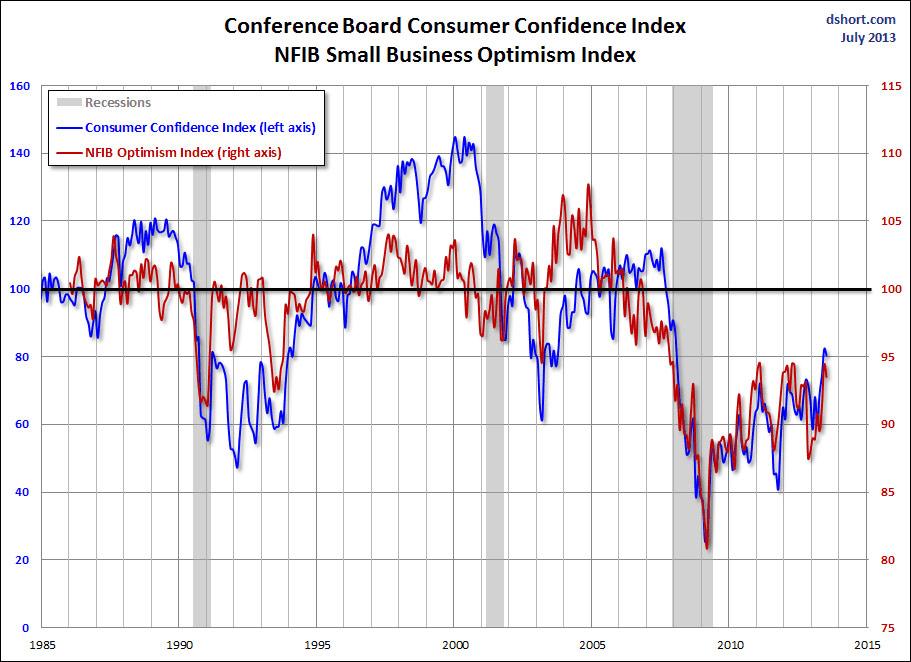The Latest Conference Board Consumer Confidence Index was released this morning based on data collected through July 18. The 80.3 reading was below the 81.4 forecast by Investing.com and 1.8 points below the June upwardly adjusted 82.1 (previously reported at 81.4). The index is now fractionally off its five-and-a-half year interim high set last month. Or, to put it another way, the index is 10.3 points below the December 2007 level, which the NBER declared as the start of the Great Recession.
Here is an excerpt from the Conference Board report.
Says Lynn Franco, Director of Economic Indicators at The Conference Board: "Consumer Confidence fell slightly in July, precipitated by a weakening in consumers' economic and job expectations. However, confidence remains well above the levels of a year ago. Consumers' assessment of current conditions continues to gain ground and expectations remain in expansionary territory despite the July retreat. Overall, indications are that the economy is strengthening and may even gain some momentum in the months ahead."
Consumers' appraisal of current conditions continues to improve. Those stating business conditions are "good" increased to 20.9 percent from 19.4 percent, while those stating business conditions are "bad" decreased to 24.5 percent from 24.9 percent. Consumers' assessment of the job market was also more positive. Those claiming jobs are "plentiful" increased to 12.2 percent from 11.3 percent, while those claiming jobs are "hard to get" declined to 35.5 percent from 37.1 percent.
Consumers' expectations regarding the short-term outlook weakened in July. The percentage of consumers expecting business conditions to improve over the next six months decreased to 19.1 percent from 21.4 percent. However, those expecting business conditions to worsen remained virtually unchanged at 11.2 percent.
Consumers' outlook for the labor market was less upbeat. Those anticipating more jobs in the months ahead declined to 16.5 percent from 19.7 percent, while those anticipating fewer jobs increased to 18.1 percent from 16.1 percent. The proportion of consumers expecting their incomes to increase decreased moderately to 15.3 percent from 15.9 percent; however those expecting a decrease declined to 13.8 percent from 14.2 percent. [press release]
Finally Casting Off the Recessionary Mindset?
 Let's take a step back and put Lynn Franco's interpretation in a larger perspective. The table here shows the average consumer confidence levels for each of the five recessions during the history of this monthly data series, which dates from June 1977. The latest number moves us 10.9 points above the recession mindset.
Let's take a step back and put Lynn Franco's interpretation in a larger perspective. The table here shows the average consumer confidence levels for each of the five recessions during the history of this monthly data series, which dates from June 1977. The latest number moves us 10.9 points above the recession mindset.
The chart below is another attempt to evaluate the historical context for this index as a coincident indicator of the economy. Toward this end I have highlighted recessions and included GDP. The linear regression through the index data shows the long-term trend and highlights the extreme volatility of this indicator. Statisticians may assign little significance to a regression through this sort of data. But the slope clearly resembles the regression trend for real GDP shown below, and it is a far more revealing gauge of relative confidence than the 1985 level of 100 that the Conference Board cites as a point of reference. Today's reading of 80.3 is 2.2% above the current regression level of 78.6.
On a percentile basis, the latest reading is at the 33.8 percentile of all the monthly readings since the start of the monthly data series in June 1977 and at the 27.1 percentile of non-recessionary months.
For an additional perspective on consumer attitudes, see my post on the most recent Reuters/University of Michigan Consumer Sentiment Index. Here is the chart from that post.
And finally, let's take a look at the correlation between consumer confidence and small business sentiment, the latter by way of the National Federation of Independent Business (NFIB) Small Business Optimism Index. As the chart illustrates, the two have tracked one another fairly closely since the onset of the Financial Crisis.
The NFIB index has been less volatile than the Conference Board Consumer Confidence Index. It will be interesting to see if the next NFIB release echoes the Conference Board's modest decline.
Source: Advisor Perspectives









